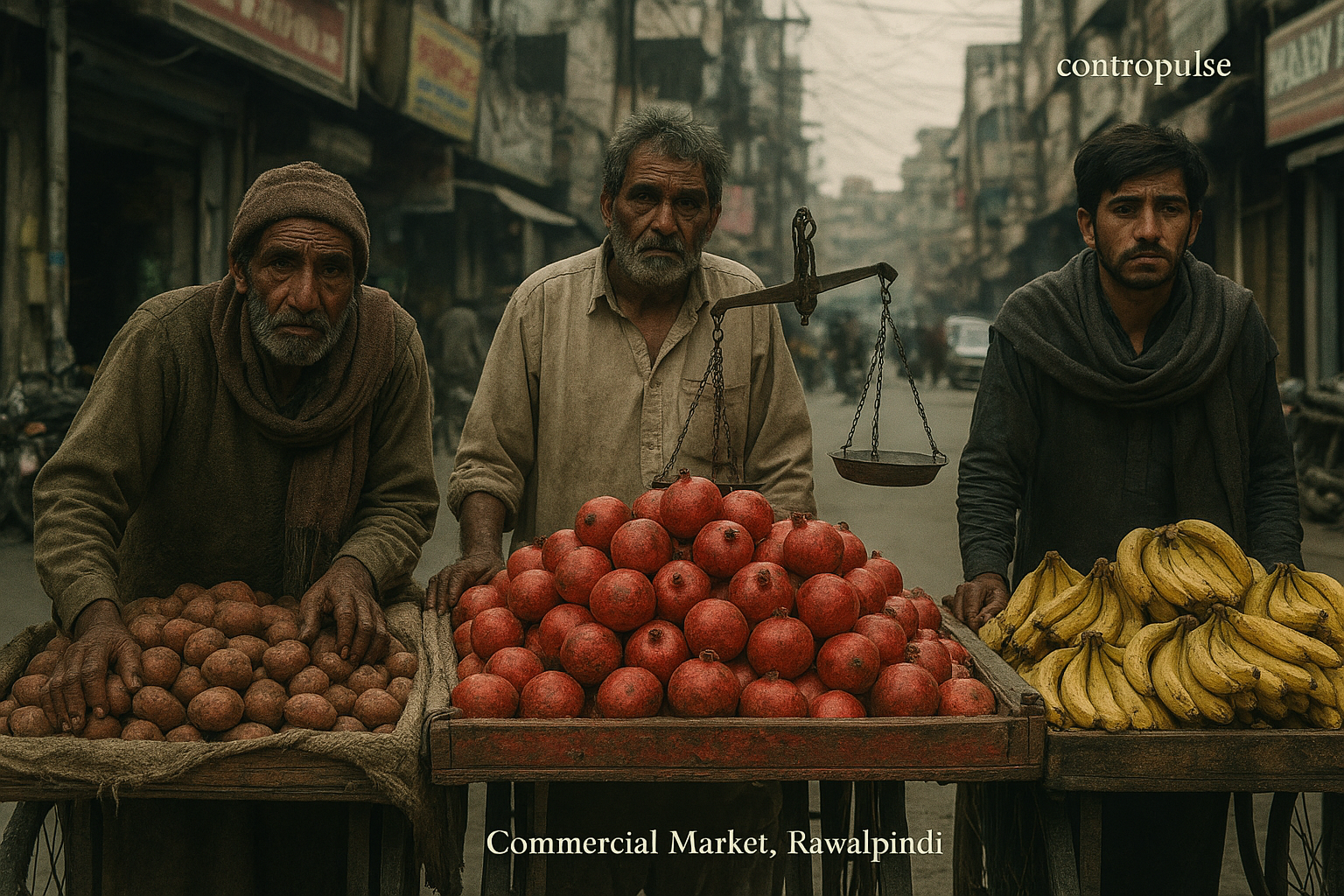Shopping is a part of our daily lives, and malls are often the first choice due to their convenience and variety. However, they are not affordable for everyone, and many middle-class families prefer local markets. One of the most popular local markets in Rawalpindi is the Commercial Market, which attracts both middle and upper-middle-class people. Street vendors in the Commercial market are mainly from middle-class families. The prices are reasonable, and a wide range of products is available, from dry fruits and handmade crafts to clothing and accessories.
Most shopkeepers here are either local Punjabis, who speak Punjabi, or Pashtuns from Bajaur, who speak Pashto. Many Pashtun vendors live temporarily in the cities by renting homes and visiting their families after several months. They sell goods from small carts, offering socks, handmade utensils, bangles, dry fruits, sunglasses, and even prepared food like samosas and cut vegetables with spices. The market is always bustling, not just for shopping but also for its street food and restaurants like Al Jazeera, Cheezious, and Ranchers. Bargaining is common, but what often goes unnoticed is the struggle of these vendors.
Poor Governance and Lack of Transparency
Many Pashtun street vendors face daily harassment from local authorities, who confiscate their carts and demand payment of Rs. 5000 to 8,000 to release them. Interestingly, it happens daily, which means they have to pay 5- 8k daily to run their business. As they contribute to the informal economy, they don’t have to pay taxes. However, they still pay huge amounts daily.
The saddest part is that a woman who sells gajrey said, “They take our 8-month-old with them.” This is so much concerning as what is the purpose of taking 8 months 8-month-old with them to the police station and returning after a whole night when they pay them around 5 to 6000? Whereas, they live on the footpath along with their families in the extreme winter night.
Living on Footpaths
A person as Punjabi and is from Wah Cantt said: “Who wants to live in road sides along his family? It is all about a matter of time and luck.” He, his wife, and two children live on a footpath because they have no place to live. He works as a dish cleaner in front of that footpath. Being an anthropologist, it was so fascinating to see a passion in him to give education to his children. He said, “I wanted to, but I can’t provide. But I wish that my grandchildren could go to school.”

A person who sells golgappy and even have 3 workers for help but when committee come, they run along sith tehir huge cart, just because if they will get caught, they have to pay 12 k, either on daily basis or whenever the committee come. So it is a never ending process.
A person said it might be possible that they might block the roads. May be that’s why the committee came and took their stalls and carts away. But first thing is, the roads of commercial market are so wide, you can see in these videos. It has a huge capacity to park tel cars, along with carts and still will have a place for customers to walk.
Lack of Transparency
Secondly, if it is a concern, which is not, why do they take huge amounts and return them? Because there is a lack of transparency and accountability. The struggle of street vendors highlights the poor governance. (Read more articles on poor governance and lack of transparency at https://contropulse.com/the-chess-board-of-politics-sacrifices-of-the-pawns-in-pakistan/ and https://contropulse.com/wp-admin/post.php?post=3043&action=edit)
Natural disasters like strong winds, rains, storm, can make their lifes more difficult. As tehir are few potholes due to which after rain, it become difficult for then to run their stalls and carts from thaoe places. Those who live on footpath have to move away to any other place in order to spend those nights and the rain make then impossible to live.
When we ask that if you really have much issues here, why don’t you move from here. They said ” So where will we go?, all the places have the same system because people are corrupt, if we will not pay, we can’t survive, so in order to survive we have to take part in this corruption too.”
Street Vendors Struggling to Not Lose Daily Customers
Another major reason behind their not moving to other places is their regular customers.
As already told that those who work around eat from then daily. So they can’t compromise or take risks, and can lose their daily customers. Secondly, if street vendors take their carts and drive around streets, it will be tough for them as it is difficult to get customers in unknown places, and many more. But what is interesting here is that this is not about all, but for the majority.
There are still some who live in privilege. For example, a flower seller who even makes gajrey does not live on the footpath but has their own house, which they have rented. But they have their permanent homes and few land back in their villages. When they have to do festivals like marriage ceremonies, birth ceremonies, and funerals, they go back to their village. So, struggles are different for different street vendors.
This place has a strong culture. Street vendors show a strong bond with each other. As a vendor that is more than 85 years old, we have been here for 15+ years. His friends of his age visit him daily, sit here and talk on different topics. One makes fitters, his grandchild, also comes after school, there, and sits around him. Shopkeepers do meet him by passing the road, and he eats those fitters at lunchtime while selling them. So for them, it is kind of nostalgia, both the place and the people around that place. So this is another reason that, besides much disparity, they still prefer to place their stalls there. (For more details, visit https://pide.org.pk/research/street-vending-an-introduction-and-overview/, https://www.crux.pk/pakistani-street-vendors-pillars-of-the-economy/, and https://www.thenews.com.pk/print/1271532-street-vending-a-boon-or-a-bane)
Watch the video to hear their lived experiences in their own words.





8 Comments